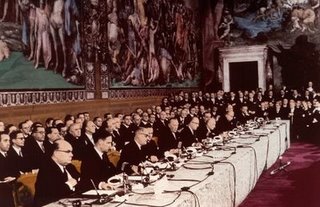 Rome - 1957
Rome - 1957By Christopher Booker
In all the years I have been reporting on the bid to give Europe a supra-national government, there are few points I have made more often than that, to understand this breathtakingly ambitious political experiment, one must always contrast the theory behind it with how it actually works in practice.
.
Its supporters always base their grandiose claims on its supposedly idealistic intentions - to save Europe from war, global warming, etc. Whereas, whenever one looks at its operations in practice, these almost invariably turn out to beincompetent, corrupt and dishonest failures.
In all the years I have been reporting on the bid to give Europe a supra-national government, there are few points I have made more often than that, to understand this breathtakingly ambitious political experiment, one must always contrast the theory behind it with how it actually works in practice.
.
Its supporters always base their grandiose claims on its supposedly idealistic intentions - to save Europe from war, global warming, etc. Whereas, whenever one looks at its operations in practice, these almost invariably turn out to beincompetent, corrupt and dishonest failures.
.
Typical of this self-deception was a wonderfully silly front page of The Independent last week, listing "50 reasons to love the EU". To anyone familiar with the EU this was hilarious. I divided its 50 points to find that 16 were "wildly misleading", 12 were "highly dubious", 10 were "plain wrong" and so forth. Not a single point cited by the Indie turned out to be a benefit that could not have been achieved without the EU.
.
A particular gem in this farrago was the claim that we owe it to the EU that "British restaurants are now much more cosmopolitan". I am sure the proprietors of our balti houses, sushi bars and Chinese takeaways would rush to agree.
.
It is also apparently due to the EU that the British "feel less insular". Such a refreshing change from those sad days when the British were so insular and closed in on themselves that they ruled over a quarter of world's land surface, establishing English as the most successful lingua franca in history (and saving Europe from the tyranny of various dictators)
.
Perhaps the most telling evidence of the gap between The Independent's ears was its claim that Brussels only employs 24,000 bureaucrats, "fewer than the BBC". Lovers of "the project" have been making similar claims since the 1970s (even Mrs Thatcher once boasted that the European Commission had a staff of"only 7,000, smaller than that of the Scottish Office").
.
In fact, this is perhaps the biggest giveway of all as to whether someone has grasped the veryclever principle which, perhaps more than anything else, has been responsible for the EU's success.
.
The commission does not need any more bureaucrats in Brussels precisely because it is merely the nexus joining together a vast network of millions of officials, stretching right across our continent. To do its bidding, it relies not just on the staff of its own ever-proliferating army of "agencies", but on the civil servants of all its 27 member states. Probably well over half the officials in Whitehall (including, for instance, virtually the entire staff of the Defra ) now spend their time working on legislation derived not from Westminster but from Brussels.
.
It is remarkable how few Europhiles (except at the top) have grasped this absolutely crucial point about how this vast and immensely complex system of government works.















No comments:
Post a Comment